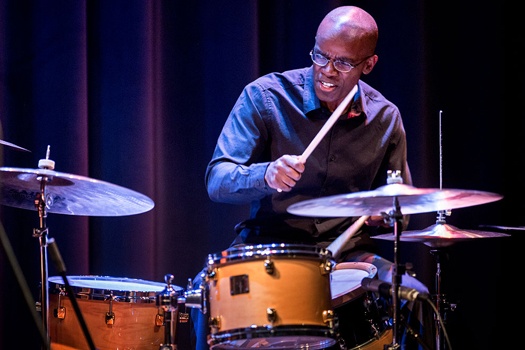American drummer Rudy Royston, who has imbued the trios of JD Allen and Bill Frisell with refined rhythmic propulsions, releases Day, a strong second installment from his Flatbed Buggy, a quintet with a peculiar instrumentation.
The group has no shifts in the lineup, relying on the powerful low sonorities of John Ellis on bass clarinet and Hank Roberts on cello, and counterweighting them with the soft accordion lines of Gary Versace. Joe Martin locks in with the drummer for a stable yet adaptable foundation.
For this new album (dedicated to his late brother Ritchie and to his music mentor and collaborator Ron Miles), Royston sonically depicts a full day of quarantine in a compelling narrative with varied moods and dynamics. Everything starts with and in the “Morning”, a simpatico number delivered with chamber tonalities and a celebratory folk manner to which the group intensely connects. Accordion, bass clarinet and cello are on the loose, while a playful groove runs at a lower level.
The modern folk-jazz vibe evinced on “Thank You For the Day” has its origin in plucked cello activity, which is soon combined with a bass pedal point and scintillating cymbal proceedings. Ellis makes his horn sing beautifully in the improvisation that ensues.
Penned by Martin, “Limeni Village” sounds polished and jazzier, but with adequate doses of abstraction. The drum fills are delightful, and Royston expands his language during the final vamp, after an immersive dialogue that occurs between Versace and Ellis. “The Mokes” carries a tango-ish feel, dropping a surprising 14-beat cycle vamp before closing, whereas the instantly catchy “Five Thirty Strut” displays a gorgeous drum intro, embracing a jubilant spirit that ends up expeditiously swinging.
Less effusive are “Look to the Hills” and “Missing You”. The former has a contemplative inception, slowly revealing an asymmetric structure caused by additive meter signatures {7+8}. The latter, a moving hyper-breathable ballad that waltzes resplendently, is the most beautiful piece on the album.
Despite of the topic, one doesn’t find nebulous atmospheres in Royston’s music. All is palpable and good-natured, eschewing flashy pyrotechnics in favor of empathetic interplay and folksy melodicism. Day is a wonderful album from an articulate drummer whose sound is contagious.
Rudy Royston, first-call drummer with Bill Frisell, Dave Douglas, JD Allen, Rudresh Mahanthappa and a host of others, is proud to present DAY, his fifth release for Greenleaf Music. DAY is the second outing from Flatbed Buggy, the adventurous, sonically varied small group that Royston premiered on the acclaimed 2018 album of that name. Marked by the low-register richness of John Ellis on bass clarinet and Hank Roberts on cello, the tonal subtlety and harmonic depth of Gary Versace on accordion and the virtuosic authority of Joe Martin on bass, the band debuted with a musical evocation of Royston’s youth spent in rural Texas. On DAY, with the same lineup intact, Royston captures the turbulent emotional landscape of a day under quarantine.
“This record is a little more aggressive than the first,” Royston says, remarking on what he calls the “dusty” sound of Flatbed Buggy and the comparatively swinging DAY. “I’m playing a little more aggressively because the scenes I’m portraying lend themselves to that. The scenes on the first record are all outdoors so you want to feel that space and air and dust. The scenes on this one, I was inside the whole time.”
Widely praised for its unusual textures and tone colors (“it’s never really a ‘drummer’s record’,” Royston comments), Flatbed Buggy has grown even more cohesive as a unit, and Royston was keen to exploit its resources in full. “They’re all such great composers in this band — I’d be an idiot not to have them write for this!” To that end, Martin’s “Limeni Village” (named for a seaside villa in southern Greece) and Roberts’ enigmatic vamp-based closing track “A.M. Hours” broaden the Flatbed Buggy sound and concept. “I can’t wait to see what John and Gary write for future projects,” Royston enthuses.
Royston’s pieces are alive with melody, rhythmic and polyphonic motion, and improvisational energy. Each carries a specific association to a time of day, from “Morning” at 7am to “Look to the Hills” at noon, from “The Mokes” at 2pm to the straightforwardly named “5:30 Strut” and “Time to Sleep.”
“There is a scripture of hope in the Bible that admonishes us to look to the hills from which comes our help and strength,” Royston writes in his album notes, and this, along with “Keep It Moving,” might be the core lasting message of DAY. Royston heeds that counsel in many ways, through music but also his new and avid pursuit of photography, as he shares in his notes: “I’d set out on landscape and cityscape photo journeys on empty roads, arriving home a few hours later feeling encouraged and strengthened from so many beautiful scenes and visions.” Photography as a means of staying engaged with the world: this was musically motivating as well, helping Royston pull together all that would in the end become DAY.







More Stories
CD review: George Benson – Dreams Do Come True: When George Benson Meets Robert Farnon – 2024: Video, CD cover
The band was tight as ever. The Warren Haynes Band cuts loose: Video, Photos
Interview with Alvin Queen: Feeling Good – I heard these tunes played by … Video, new CD cover, Photos